Popular Content
Want Email Updates?
Get emails about new stuff.
Be the first to know.
Looking for Something?
Theme Worksheets
The theme of a story is a message that the author is trying to express. The author does not explicitly state the theme. To discover the theme, the reader must make some deductions concerning events in the story.
Identifying the theme of a story can be challenging. Fortunately, as with all reading skills, practice makes perfect. These theme worksheets will help students achieve mastery of this essential reading skill. I recommend starting with the theme PowerPoint lesson posted below. Also, you may be interested in my advice on teaching theme.
Theme Lesson 1
Here is an animated PowerPoint slideshow teaching students about THEME in stories. It includes definitions, explanations, and examples. Also, there is a review activity at the end of it. This activity is a great way to start your unit on theme.

Theme Lesson 2
Here is another animated PowerPoint slideshow teaching students about literary theme. This is a revision of my first theme lesson. It includes the same definitions and explanations but NEW EXAMPLES. Also, there is a review activity at the end of it with NEW PRACTICE PROBLEMS.

Theme Worksheet 1
Are you looking for an engaging activity to help your students review or practice identifying themes in short stories? Good news! You've found one here. In this worksheet students will practice identifying themes in five short stories. Students will read each story, determine the theme, and explain their answers. Suggested reading level for this text: Grade 4-8.
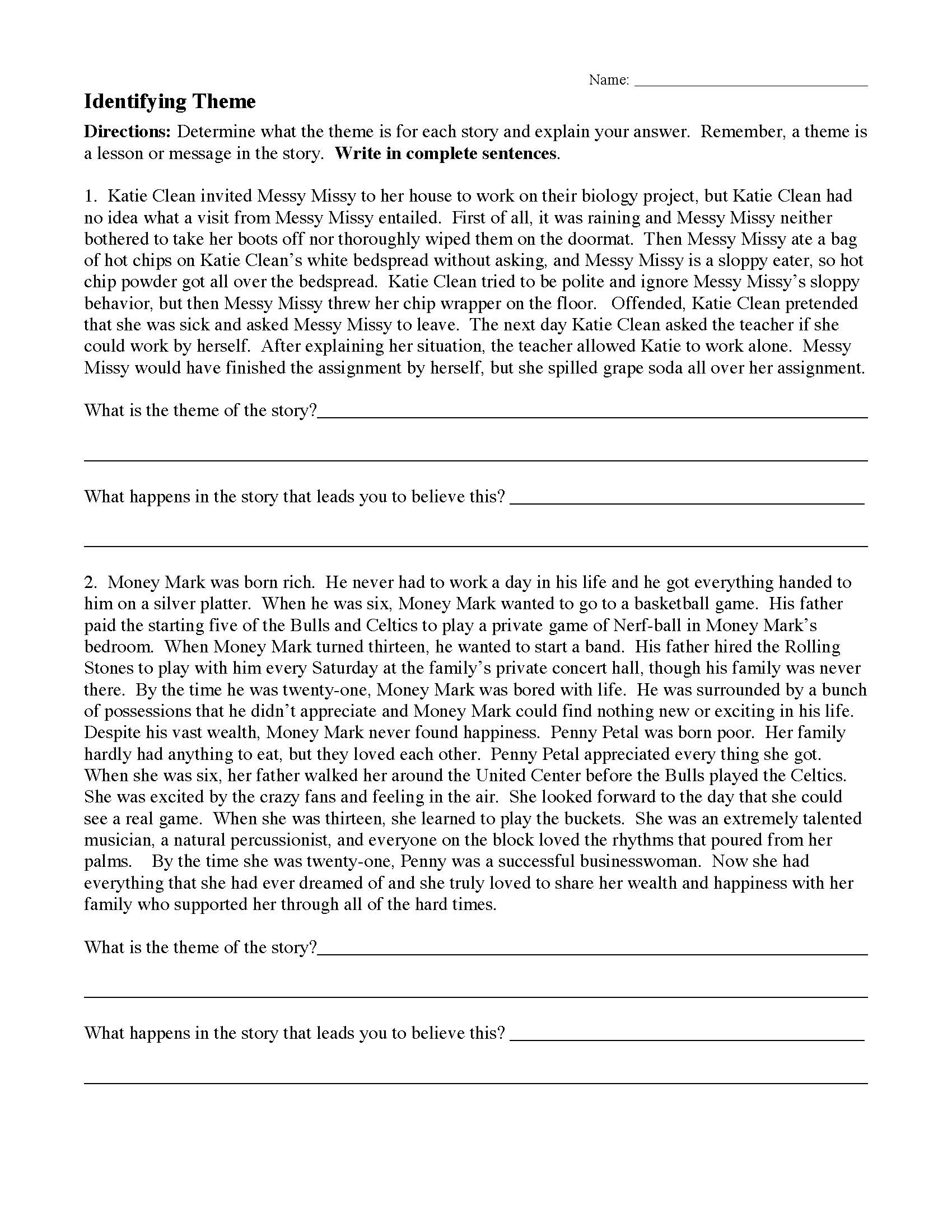
Theme Worksheet 2
Here's another engaging activity to help students practice identifying themes in short stories. In this worksheet students will read five original short story passages and determine the theme or message of the story. Also, they will explain how they got their answers. Suggested reading level for this text: Grade 4-8.
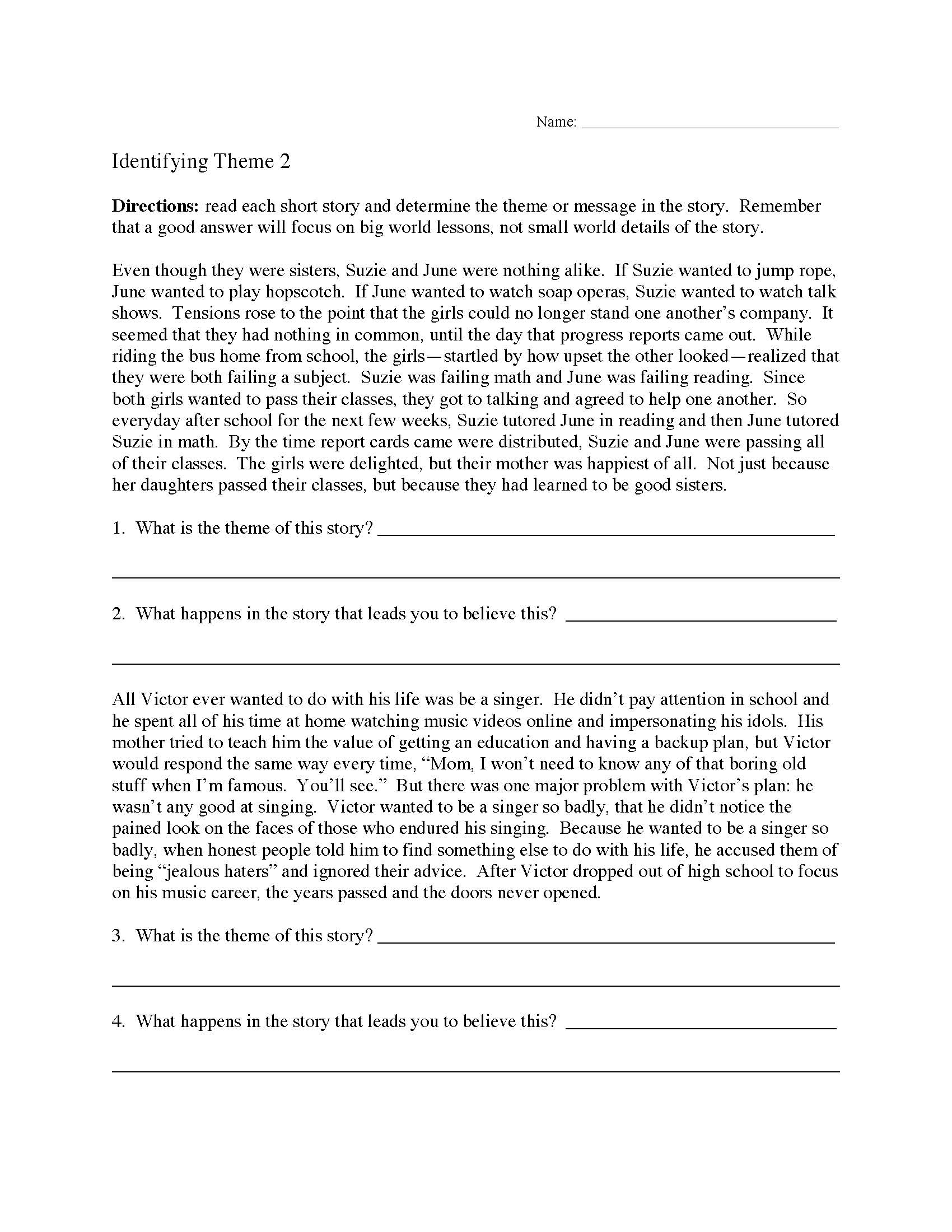
Theme Worksheet 3
Here's yet another theme worksheet to help your students master this challenging skill. Students read the short stories and extract the message. Then they support their answers with textual evidence. Suggested reading level for this text: Grade 4-8.
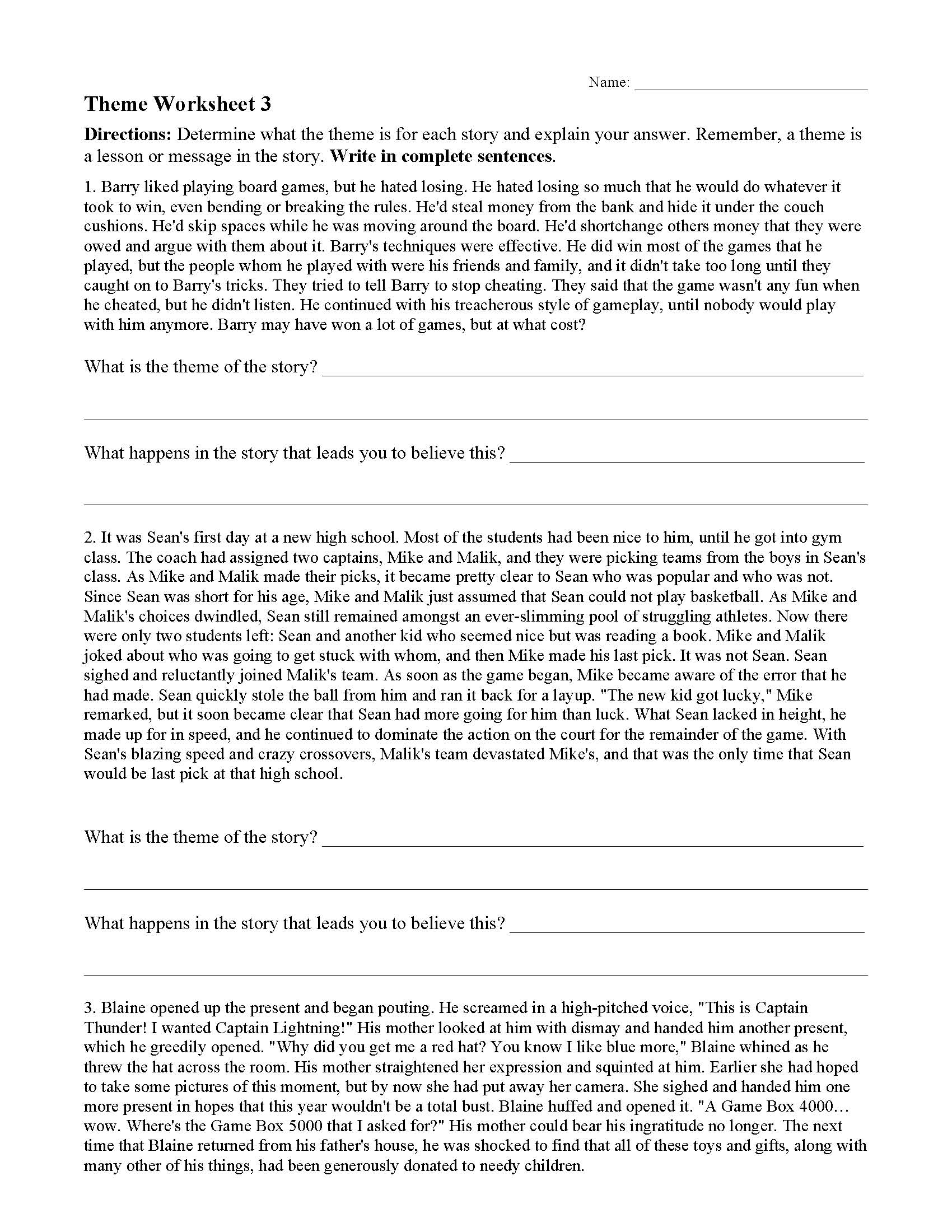
Theme Worksheet 4
Being able to identify the theme of a story is an important reading skill. Being able to support your answer with textual evidence is more important. This theme worksheet requires students to do both. Suggested reading level for this text: Grade 4-8.
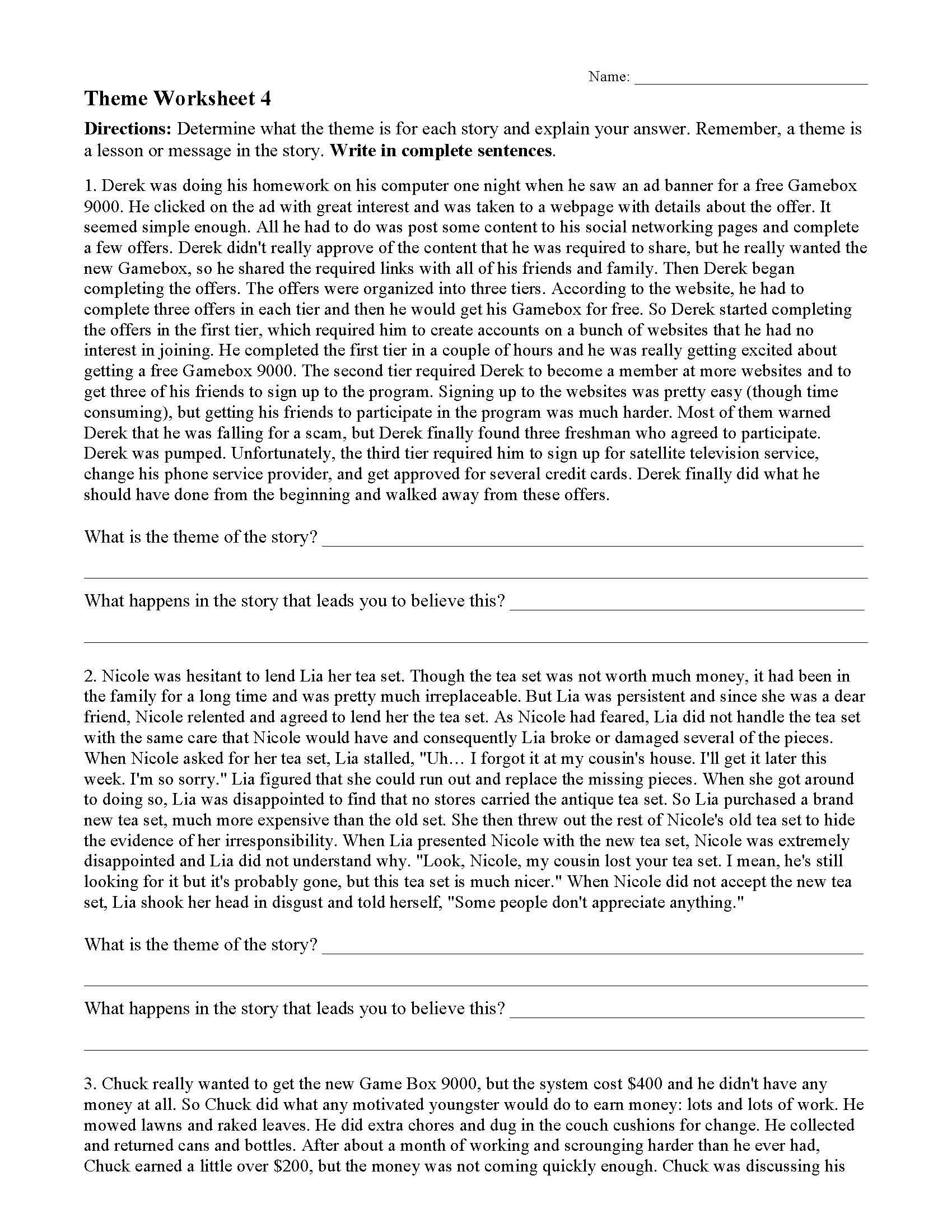
Theme Worksheet 5
Here is another double-sided theme worksheet. It has five passages from which students can extract a message. Students support their answers with textual evidence. Suggested reading level for this text: Grade 4-8.
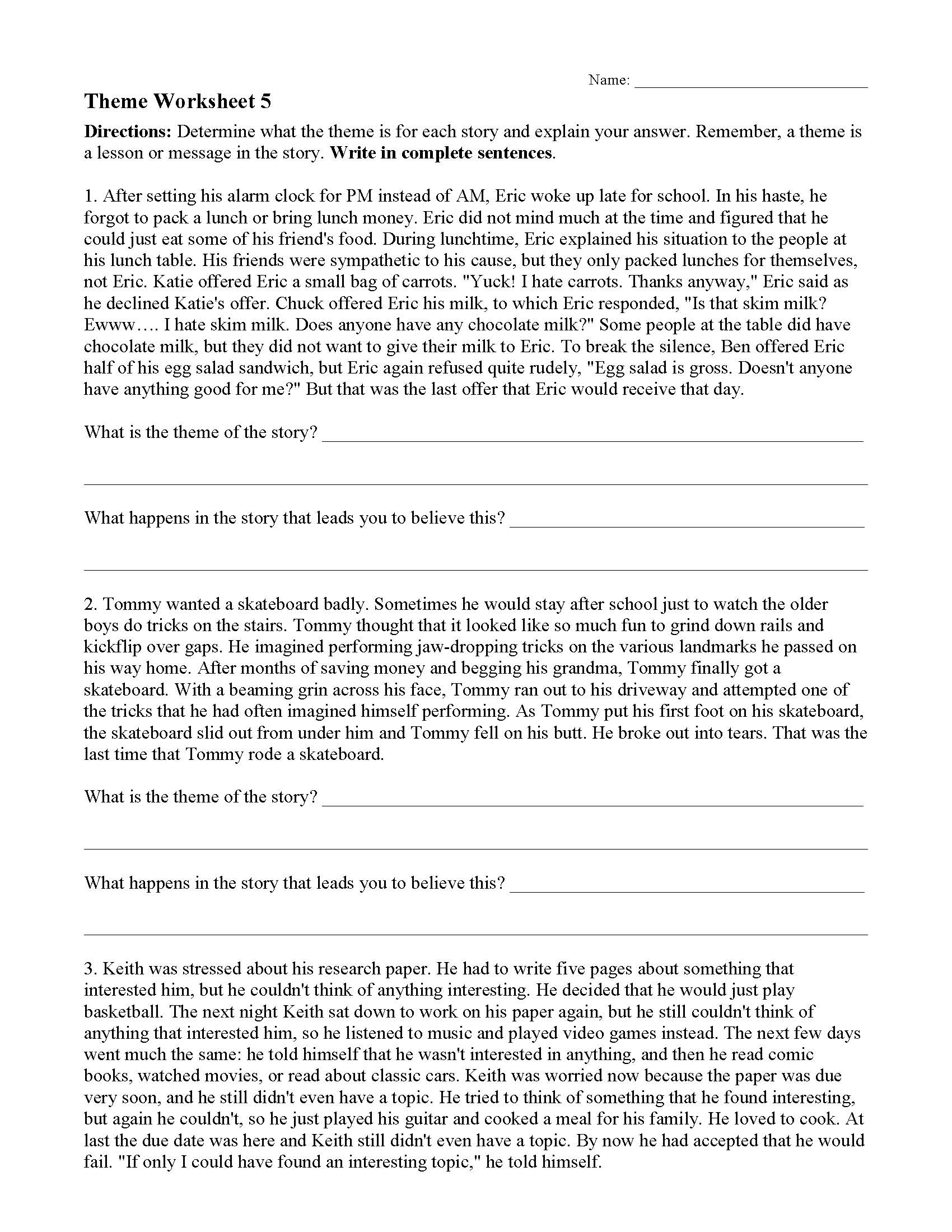
Theme Worksheet 6
This worksheet contains another five short stories to give students practice identifying themes. Students read the short stories, identify the themes, explain their answers using text. Suggested reading level for this text: Grade 5-9.
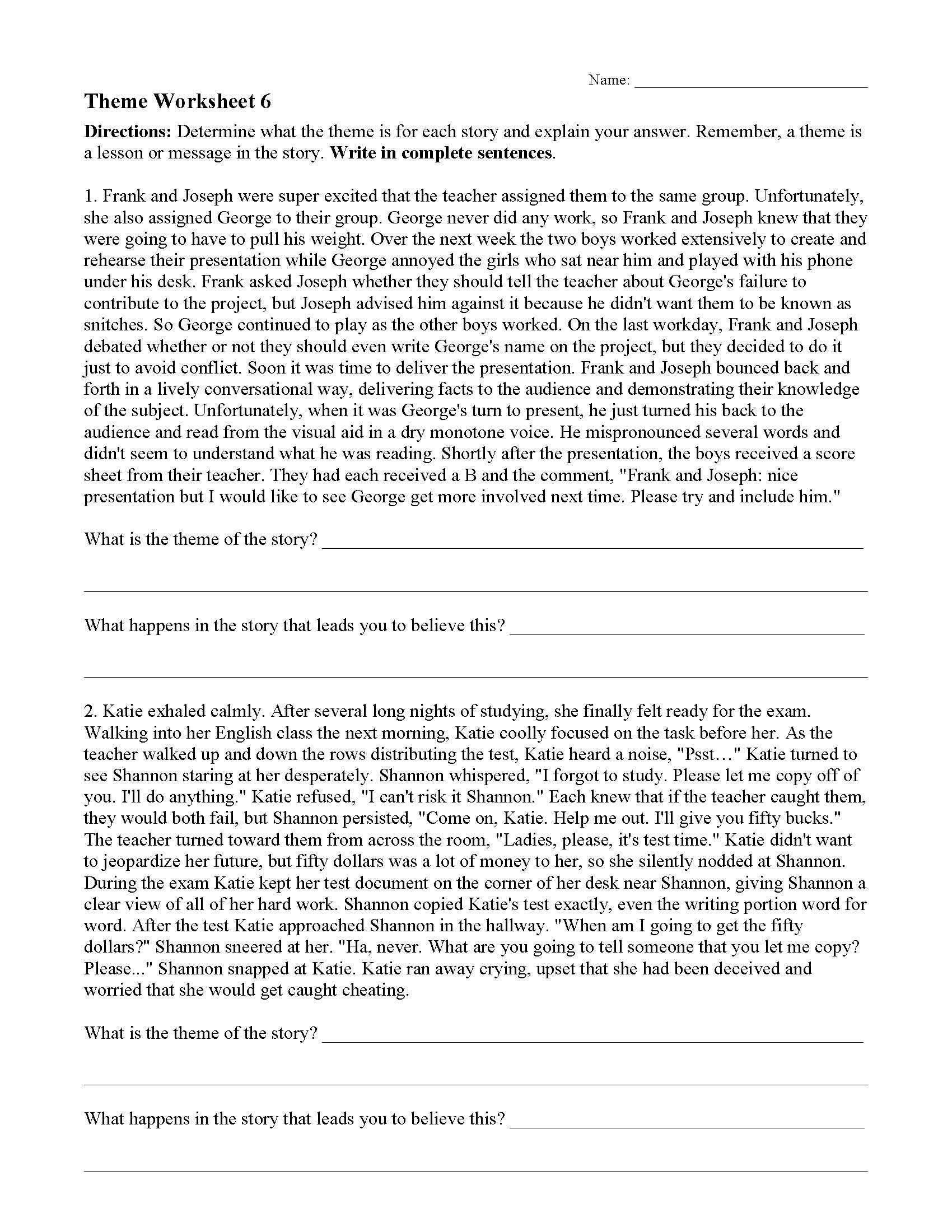
Theme Worksheet 7
This worksheet offers even more practice with identifying themes. Students read the short fiction passages and determine the life lesson of the story. They support their answers with textual evidence. These worksheets are aligned with Common Core State Standards. Suggested reading level for this text: Grade 4-8.
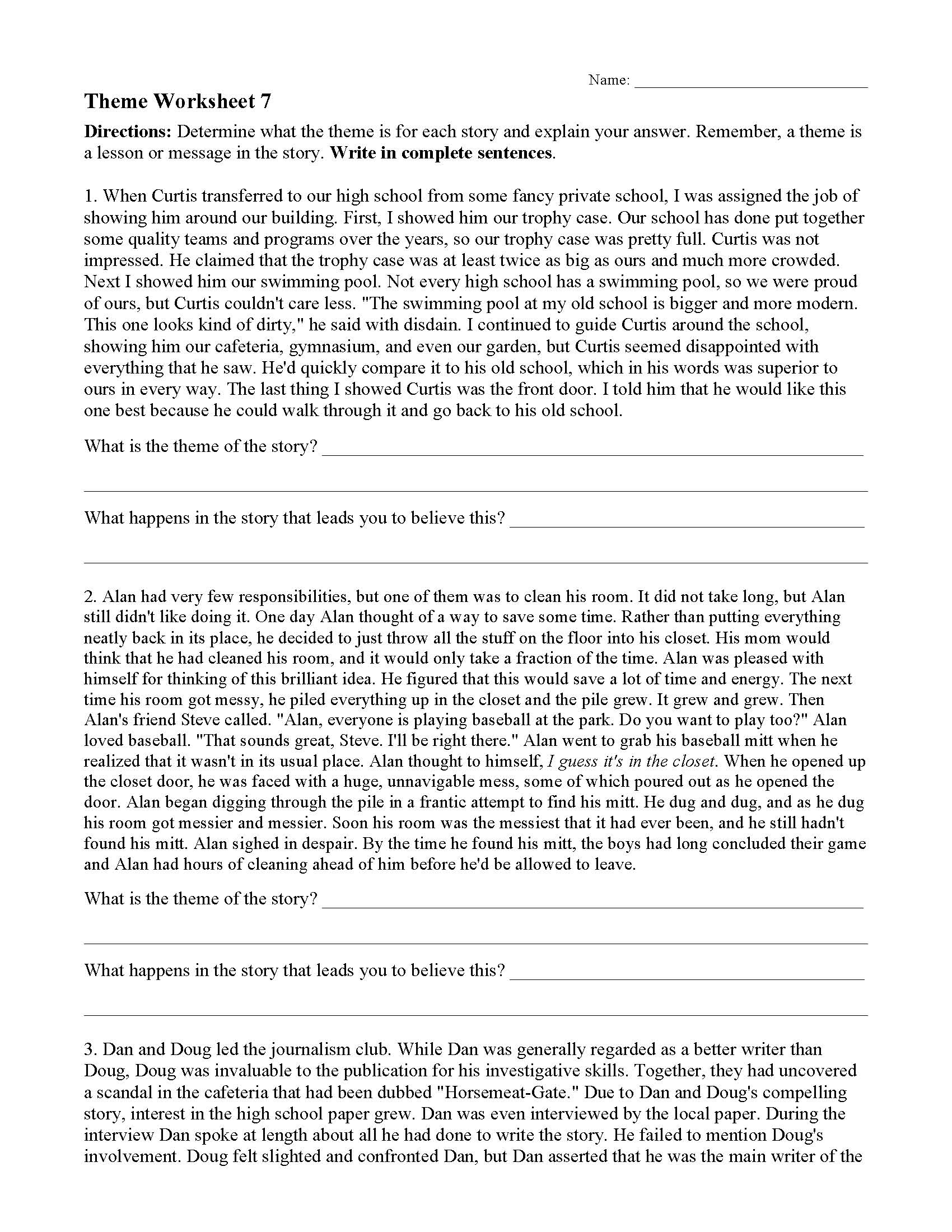
Understanding Theme with Fables 1
This worksheet features classic fables by Aesop. I have removed the explicitly stated morals. Students must draw conclusions to infer the meaning or theme of the fables. This worksheet is 4-pages and has 15 problems. Suggested reading level for this text: Grade 4-8.
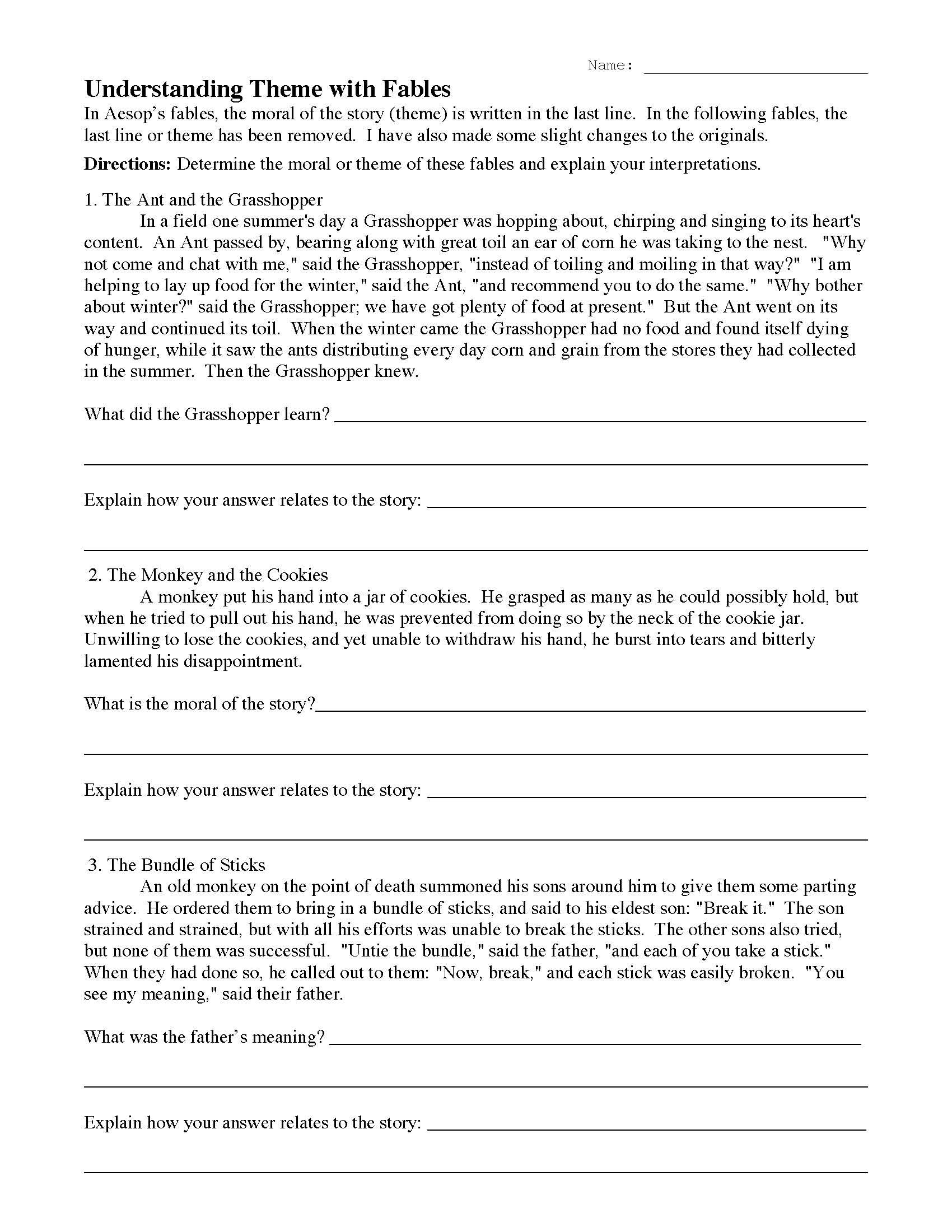
Understanding Theme with Fables 2
Here is another theme worksheet featuring classic fables by Aesop. Once again I have removed the explicitly stated morals. Students should read the fables and draw conclusions to infer the meaning or theme. This worksheet is 2 pages and has 5 problems. Suggested reading level for this text: Grade 4-8.
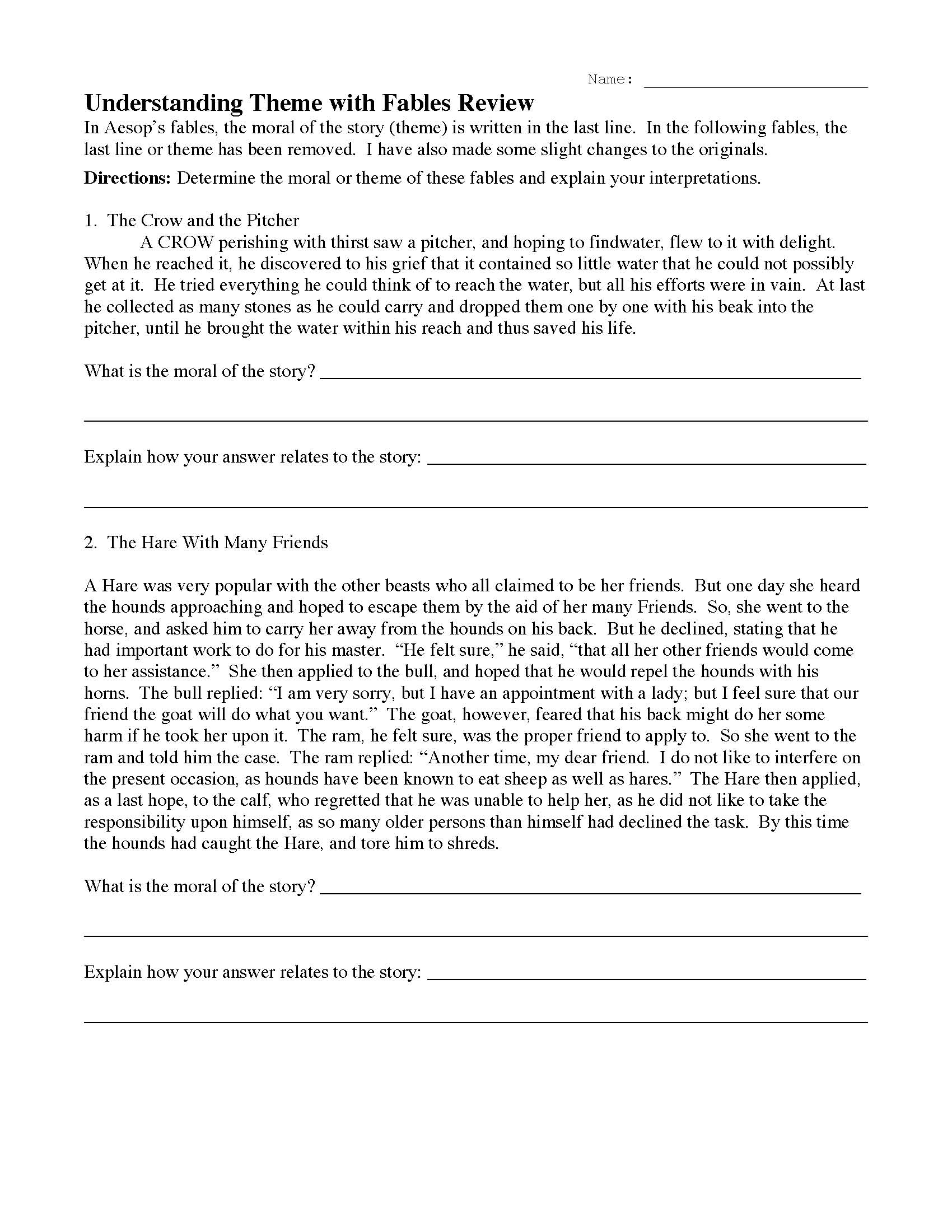
I hope that these theme resources help students meet learning goals.

Good readers can infer the author's theme or message.
Theme
Common Core State Standards
Theme Anchor Standard
R.2 - Determine central ideas or themes of a text and analyze their development; summarize the key supporting details and ideas.RL.1.2 - Retell stories, including key details, and demonstrate understanding of their central message or lesson.
RL.2.2 - Recount stories, including fables and folktales from diverse cultures, and determine their central message, lesson, or moral.
RL.3.2 - Recount stories, including fables, folktales, and myths from diverse cultures; determine the central message, lesson, or moral and explain how it is conveyed through key details in the text.
RL.4.2 - Determine a theme of a story, drama, or poem from details in the text; summarize the text.
RL.5.2 - Determine a theme of a story, drama, or poem from details in the text, including how characters in a story or drama respond to challenges or how the speaker in a poem reflects upon a topic; summarize the text.
RL.6.2 - Determine a theme or central idea of a text and how it is conveyed through particular details; provide a summary of the text distinct from personal opinions or judgments.
RL.7.2 - Determine a theme or central idea of a text and analyze its development over the course of the text; provide an objective summary of the text.
RL.8.2 - Determine a theme or central idea of a text and analyze its development over the course of the text, including its relationship to the characters, setting, and plot; provide an objective summary of the text.
RL.9-10.2 - Determine a theme or central idea of a text and analyze in detail its development over the course of the text, including how it emerges and is shaped and refined by specific details; provide an objective summary of the text.
RL.11-12.2 - Determine two or more themes or central ideas of a text and analyze their development over the course of the text, including how they interact and build on one another to produce a complex account; provide an objective summary of the text.
Click to VIEW Grade Level Standards for R.2
Still looking for something?
Search here.
Search here.
Leave a comment
188 Comments
Leave a Reply
By Using This Website You Agree to the Terms of Use and are aware of our privacy policy.
Subscribe Now
Get emails about new stuff.
Don't worry. I hate spam too.
Some Other Useful Pages
- Author's Purpose Worksheets
- Characterization Worksheets
- Conflict Worksheets
- Fact and Opinion Worksheets
- Figurative Language Activities
- Figurative Language Poems with Questions
- Genre Activities
- Irony Worksheets
- Making Predictions
- Mood Worksheets
- Nonfiction Passages and Functional Texts
- Parts of Speech Worksheets
- Poetic Devices
- Point of View Worksheets
- School Project Ideas
- Setting Worksheets
- Simile and Metaphor Worksheets
- Story Structure Worksheets
- Text Structure Worksheets
- Theme Worksheets
- Tone Worksheets
- ALL PAGES AND WORKSHEETS
Search This Site





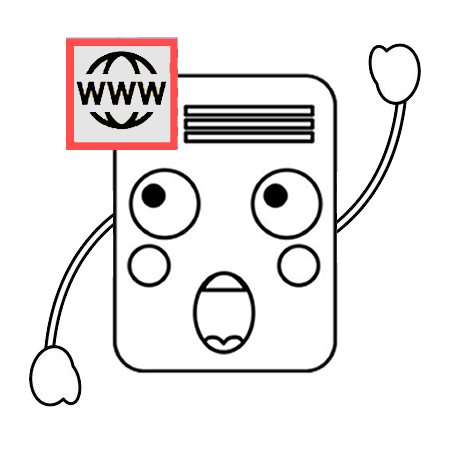

N.K.
/ February 18, 2013Very useful sheets.
DTR
/ January 31, 2013Do you have answers for the powerpoint?
Leisha
/ January 26, 2013What a great resource! Thanks! I
moe
/ January 22, 2013i think this website is really helpful we are learing this in my reading class
Abigail Bowes
/ January 12, 2013As an Special Education teacher I am always looking for instructional resources to help my students access the general education curriculum. I have searched for lessons to teach the concept of theme to my 5th grade students with Exceptional Needs. Your PPT lesson plan and Worksheets are just what I needed. Thank you.
Alison
/ January 9, 2013Thank you for all the time and effort you put into making my life just a little easier. I have enjoyed reading your classy responses to the ones that disagree with your definition of theme. I’ve never understood the need to bash someone else’s viewpoint in public. As a middle school teacher, I agree with your defintion. I will be using your material in my class today. Thanks again!
Mr. Morton
/ February 3, 2013Thank you.
Thae Su Kyi
/ December 31, 2012This is a great website. Can I ask you whatever I want to know about literature. Please, be my teacher.
Jimmy
/ December 28, 2012What grade is this for elementary?
Mr. Morton
/ January 5, 2013I don’t know. Read them and decide if they are appropriate for your students. Thanks for visiting!
Aubrey ferreros
/ December 3, 2012Um,I’m getting confused from some of them.
Mr. Morton
/ January 5, 2013Specifically what are you confused by?
RaShunna
/ October 23, 2012Thanks so much. Very helpful.
Christian
/ October 21, 2012Thanks soooo much! This website was so helpful!
Erin Lee
/ October 20, 2012A THEME IS NOT THE MORAL OF THE STORY!!!!!!!!
Mr. Morton
/ January 5, 2013Please explain the difference to me, quietly if you could.
Jonathan Cole
/ February 27, 2013A theme can be the moral lesson in a story or fable!
A. Smith
/ October 10, 2012Thank you very much. This is very helpful!
Michelle Daniel
/ October 9, 2012What is the theme of the first story in the Power Point?
Karen
/ October 3, 2012This looks great. Currently on a long term job with little to no lesson plans. Just stories….I am guessing what is supposed to be taught. Thank you so much!!!!!
Simona
/ September 23, 2012Teaching children about themes is somewhat challenging. Thank you for sharing and helping others.
Lindsey
/ June 27, 2012Really nice explanation of theme, accompanied by short, focused practice. Thank you for this resource!
Tanya
/ May 22, 2012Thank you for posting these. My 6th graders were having a difficult time pulling out the themes. I used the fables in small groups. Each group answered the questions and discussed their choice of answers with the rest of the class.
Mr. Morton
/ August 10, 2012That sounds fun. 😀
Bob
/ May 2, 2012Despite the information provided in the power point and worksheets, theme is not “a lesson or message in a story”; it’s a philosophical topic that the piece explores. These worksheets are teaching something like “the moral to the story” which is not what theme is. Theme is more open-ended. I wouldn’t suggest this for high school students, first of all, because it’s incorrect, and second because it’s far too simplistic.
Mr. Morton
/ May 3, 2012Thanks for your input, Mr. Bob. You seem to have outgrown your need for worksheets. Best wishes.
LT
/ April 15, 2012Love the site. Thanks so much.
J. Duncan
/ April 11, 2012What are the answers for the themes passages in the powerpoint?
Marla McDonough
/ March 20, 2012So helpful…. The “worksheets” (which are so much more than just that) work great in the classroom. Thank you!!
Barbara Scheuter
/ March 4, 2012Thank you for your theme worksheets. I was looking for a clear explanation to help my students understand theme and I think these will be great. Thank you so much.
Sarah
/ March 4, 2012Wonderful, wonderful, wonderful! The “Identifying Theme” stories are perfect. I can’t wait to try this unit out with my 7th graders!
Thank you!!!
Teresa
/ February 16, 2012I love this site. Alot of reading skills made easy. Thanks
SiskiyouSue
/ February 13, 2012Thank you. These will be a big help!
Mrs. Mai
/ February 11, 2012Two words.
You Rock!!
Cindy Spencer
/ February 10, 2012I have enjoyed using your site until today. I sent home a theme paper for homework last night that was not appropriate for 5th grade students. I should have proofread it, but it never occured to me that a story like that would appear on a 5th grade level worksheet. I will definately proofread from now on.
Mr. Morton
/ February 13, 2012Perhaps sharing your experience may help others. Thank you.
B. Kalis
/ February 3, 2012Mr. Morton,
What are your thoughts on theme vs. subject? Our Language Arts curriculum states that “the themes is the subject.” I disagree!
Thank you for your insight!
Mr. Morton
/ February 13, 2012Yikes, I’d hate to get involved in a war of semantics:
the great battle of tomato (toe-mot-toe) and tomato (toe-may-toe),
but you’ve intrigued me.
Knowing that this is a moot battle of opinions,
I side with you, Kalis.
I understand theme to be an implicit message that the author strives to communicate to the reader, one which offers wisdom or an alternate understanding of the world (for long);
or, the message of the story (for short).
Theme as subject doesn’t really make sense to me.
Does that mean that the theme of Lord of the Flies is
boys alone on an island or something?
If so, I can’t accept that definition.
Student 107
/ January 31, 2012Wow, in my langeuage arts class my teacher gives us the freedom to roam aroud the internet looking for resources and i didnt understand how to identify themes. i hope this help me and my friend on our test next week. Great and useful information!!! Thanks!!
Mr. Morton
/ January 31, 2012That sounds like an interesting review activity. Thanks for making your way over here, and I share your hopes.
Lida
/ January 17, 2012Thank you. You answered some questions that we had about theme. I hope you don’t mind that I posted your Powerpoint on my website.
Mr. Morton
/ January 23, 2012I love links. You’re free to use my materials in any non-commercial manner that you please. Thanks for visiting!
Katie
/ January 7, 2012Thank you! I have been looking for extra practice I can post on my website for parents and students.
Here is a tip I’d like to share that worked wonderfully with my sixth graders: I made a station activity with fable posters that I had laminated and folded the edges over to make numbered flaps. I added Velcro so each flap stayed closed. Each group wrote their statement of the theme under their flap, and then got to look at how other groups had said the theme (often paraphrased, so we talked about that). Your stories would work perfectly for this!
Mr. Morton
/ January 7, 2012Thanks for the clever suggestion, Katie.
Jacqueline
/ December 19, 2011Very helpful. Thank you so much :o)
Cathie
/ December 16, 2011Thanks, again. As a reading teacher for gifted students, I am always looking for supplemental materials for independent practice. You have made these worksheets interesting enough for them that it holds their attention. Additionally, I find them extremely useful as teaching tools for my “regular ed” students, too.
Ms. Navarro
/ November 30, 2011Thanks so much! You have given me a great tool to teach theme to my 7th grade students.
T Fraga
/ November 17, 2011I used this with my 7th graders today, and it was fabulous! The stories on the worksheet were entertaining and effective. Thank you!
laura
/ November 15, 2011answers for theme worksheet 2
Mr. Morton
/ January 14, 2012The answers will vary. You’ll just have to use your best judgement and demand that the students adequately justify their answers.
Amanda
/ November 14, 2011Do you have the answer key for the Theme Worksheet 2?
Mr. Morton
/ January 23, 2012Added.
Mary
/ November 5, 2011Do you have the answers to the slide stories in the ppt?
Mr. Morton
/ November 7, 2011Not currently, but if there’s an item that’s giving you trouble, run it by me.
Ally
/ October 25, 2011The stories are great!!!!! Thanks!
Devin
/ September 22, 2011For a first year language arts teacher your website has been a great resource!!!
Thank you very much!
Mr. Morton
/ September 22, 2011I’m happy to help.
May your students learn much.
Thang Sian Tuang
/ September 22, 2011thank you for sharing a bout the theme of teaching and the worksheet.By your help I could used your idea in my teaching.
Mr. Morton
/ September 22, 2011That’s super cool.
I’m so happy to help you.
Thanks for visiting.
Lori
/ September 18, 2011Thank you so so much for all you have put on here, it has been a great resource for me and my students
Holly
/ September 15, 2011I agree with Andrea H. Amazing site that I’m using a lot this year! Do you have any characterization stuff? I always feel like I don’t explain that well enough to my students. Thanks again!
Mr. Morton
/ March 30, 2017http://www.ereadingworksheets.com/free-reading-worksheets/characterization-worksheets/
Andrea Holder
/ August 31, 2011In one month of school, I have already used so many of your worksheets. Your skills are so closely aligned to ours, and I love having the quantity on top of the quality. I don’t know what I did before I found your site. It is now my “go to” website. I have also sent the web address to everyone in my department. Thanks so much for all of it!
Mr. Morton
/ August 31, 2011Dang, Andrea, that’s some generous praise. I’m happy to help. Thanks for the referrals too.
Mrs. Davis
/ May 15, 2011This is a great site this lesson will help me with my final paper in a great way.
Megan
/ May 1, 2011Great site! Thanks for sharing!
Kyle Cooke
/ April 21, 2011WOW! Thanks so much!
Angela
/ March 22, 2011Would you happen to have answer keys for these worksheets?
Mr. Morton
/ March 25, 2011Answers have been added. Thanks for visiting!
Talassown
/ February 19, 2011Nice site.